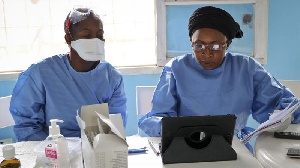A GNA feature by Miss Grace Alswell Aidoo (AIJC Intern)
Accra, Sept. 15, GNA- Women who undertake the biblical assignment "to be fruitful and multiply", are dying in their numbers in Ghana thus making procreation a very dangerous venture.
Five hundred maternal deaths have so far been recorded between January and June this year due to pregnancy-related complications compared to 824 deaths in 2004.
The frightening statistics did not include deaths that occurred in homes, shrines, churches and private hospitals. A report by the World Health Organisation (WHO) said 30 million women living in malaria endemic areas in Africa became pregnant each year and in Ghana maternal deaths attributed to malaria in pregnancy is estimated at nine per cent.
Even though documentation on malaria in pregnancy is not available, it accounts for more than 40 per cent of all outpatients' department attendance at hospitals. It is also estimated that malaria-induced anaemia killed 200 women each year in Ghana.
Dr Henrietta Odoi-Agyarko, Head of the Reproductive and Child Health Care of the Ghana Health Service (GHS) said in Accra that 12,000 women were likely to die by 2015 if prompt attention was not paid to address the problems leading to the preventable deaths.
She attributed the deaths to women, who failed to detect danger signs during pregnancy, delivery and after delivery and the undue delay in rushing expectant mothers, who had developed health complications, for medical attention.
Dr Odoi-Agyarko said maternal deaths could also be attributed to deliveries at close intervals and the inability of pregnant women to access appropriate modern family planning methods.
Emphasizing the need for child spacing, Dr Gloria Quansah Asare of the National Family Planning Programme, has indicated that the deaths of children under five years of age in Ghana would fall by 21,700 annually if birth intervals were increased from 24 months to 36 months. She said infant mortality rate would drop by 27 per cent while under-five year old children mortality rate could also go down to 23 per cent if family planning methods were effectively adopted. Dr Asare noted that there was low level of contraceptive use, high proportion of traditional methods and high levels of unmet needs leading to many unwanted pregnancies, abortions and deaths.
"Eliminating unmet needs will allow individuals and couples to achieve their reproductive goals and rights by reducing abortions, unintended births and pregnancies," she said. Dr Quansah Asare explained that two-thirds of married women in the country did not intend to use family planning in future for reasons such as fear of side effects, opposition from husbands and the desire for more children.
She noted that although the users of family planning methods might experience discomfort at the initial stage, the benefits of avoiding unwanted pregnancy far outweighed temporary discomforts. Professor Agyeman Badu Akosa, Director-General of the GHS, said many women had lost their lives during pregnancy and delivery, which could have been prevented, stressing the role of family planning in saving the lives of women and children.
He said 15 per cent of all pregnancies were among teenagers hence the need to intensify public education on pre-marital sex. Anaemia related deaths caused by poor diet is preventable and according to Mrs Kate Quarshie, an Anaemia Programme Coordinator, fruits, meat, fish, grains, green vegetables are some sources to avoid the silent plague.
Most importantly pregnant women should eat enriched foods of iron (meats, poultry and fish) and fruits everyday. The time has come for the high maternal mortality rate to be brought down through national policies such as the free medical care programme for expectant mothers, to prove to God that Ghana has accepted the challenge to be "fruitful and multiply' fully and ready to do just that.
Opinions of Friday, 16 September 2005
Columnist: GNA
Help! Our Women Are Dying
Opinions













